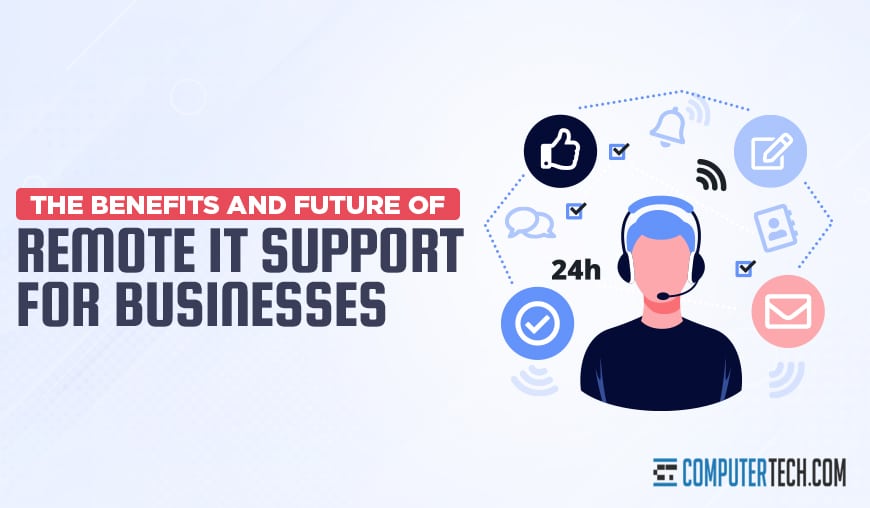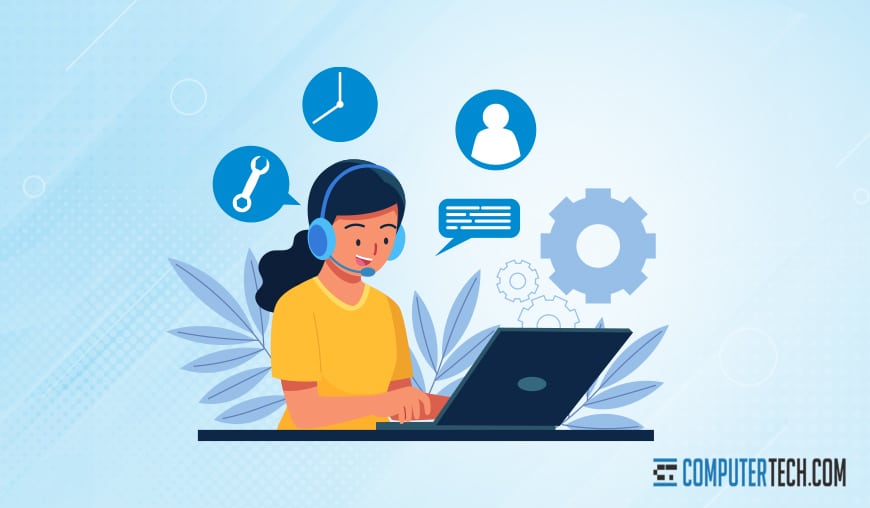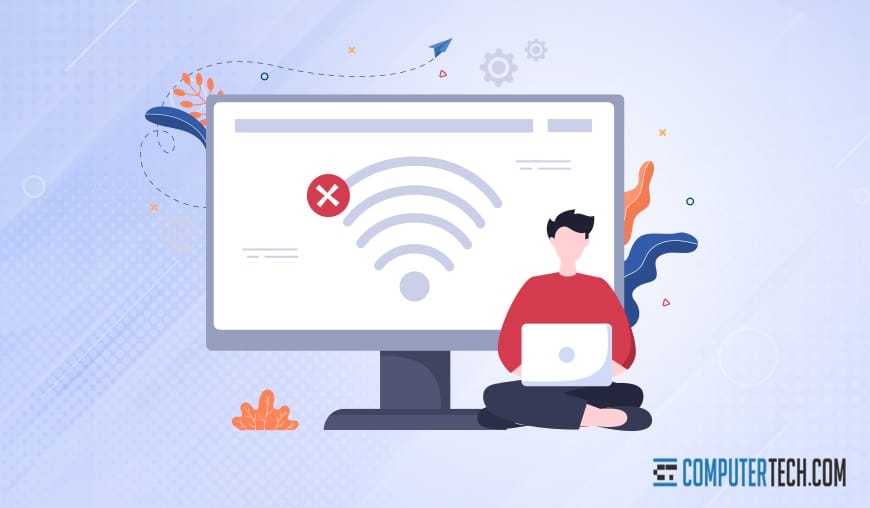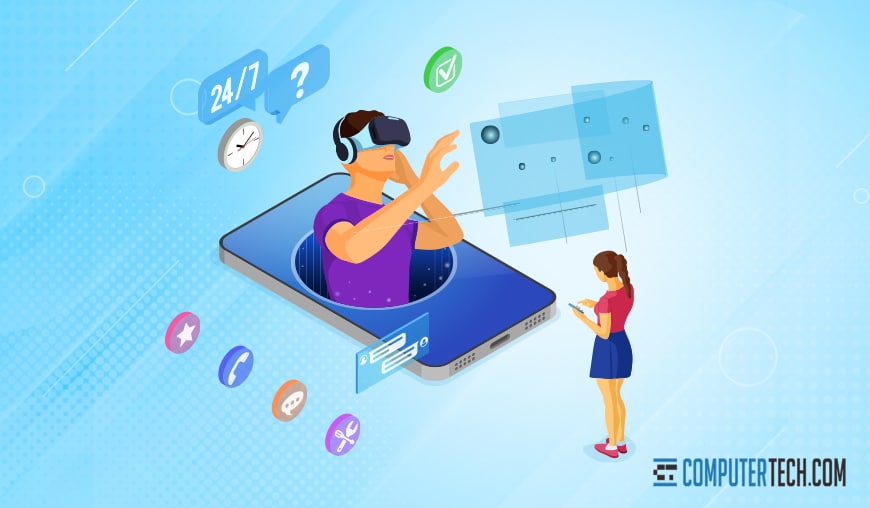-

Information technology services are an essential part of any business that uses computers and other devices to conduct their daily tasks. Since computers became a common tool for most businesses, IT services have been rendered in person to maintain and resolve any technical issue a company machine might be experiencing.
However, the evolution of technology is also paving the way for a change in IT services. Namely, remote IT support has been on the rise and saw a more significant spike in 2020 following the first peak of the COVID-19 pandemic. However, there has been some concern about how effective remote services can be when dealing with machines in the office. With this article, we hope to provide some insight into how remote IT services can benefit and develop into greater service in the future.
How Does Remote IT Support Work?
When a machine is malfunctioning, having someone troubleshoot the issue from somewhere else might seem counterintuitive or otherwise impossible. However, tools have made remote IT troubleshooting and solutions a viable option with equally effective results. The reason for this is that modern IT firms have begun making use of software that allows software issues to be analyzed and resolved in ways that make a technician coming into the office an antiquated process. This software allows your IT department or the firm you have outsourced those services to connect to your company computer and control it remotely.
This remote control of other devices allows them to evaluate the condition of your computer, track down the error, and apply solutions without even setting foot in the office. This efficacy means that the performance of remote IT services does not see a diminished return even though you do not directly interact with the IT technician.

Remote IT support also uses software that enables file transfers and synchronization so that your IT provider has access to all the same files and information as your employees do. This access means they will be able to cross-reference what information should be present in your employee’s devices and replace any that was lost if need be.
These abilities alone make remote IT support a viable option for the functionality of the practice. However, you might yet be wondering what benefits switching to a remote IT support system might yield that a standard in-person support network might not.
The Benefits of Remote IT Support
Information technology support is an essential facet of your corporate support network, and you want to be sure you employ the correct variation. While technicians coming to you and investigating the issue has been the norm for a long time, remote IT support has proven to bring with it a wide array of benefits that in-person support cannot provide. As a result, many companies are switching to remote IT to gain these benefits instead of sending machines to technicians or bringing technicians to look over machines.
The first major benefit that remote IT support offers is that it is simply a time saver. If your staff relies on computers and other technology to perform even the simplest of their assigned tasks, having a machine on the fritz is a significant blow to office productivity. This detriment is especially true for those who do not maintain an on-site IT department and instead outsource to a third-party provider.
Prior to the arrival of remote IT support software, when a machine lost functionality, the employee was helpless to do anything until a technician arrived to diagnose, troubleshoot, and resolve the issue. This waiting can lead to excessive downtime that severely impacts the productivity you see in a day. You need to wait until a technician becomes available and for them to drive to and arrive at your office.
However, employing a firm that offers remote support services allows you to avoid this issue. With remote support, as soon as an IT technician becomes available from the firm you have contracted, they can contact your employee and use the remote-control function to diagnose the situation and apply solutions without ever leaving their current location. This speed will result in shorter periods of downtime between the machine going down and your employee returning to their daily tasks.

Another significant benefit that remote IT support offers is that it allows your employee to get direct support. For example, rather than having a technician repair their machine on their behalf while coordinating with the IT department or firm you use, the technician directly corresponds with the employee having the issue. This interpersonal interaction between employee and technician promotes a shorthand and understanding. In addition, it makes it so that any future issues can be met with quick resolution rather than an employee waiting in a queue for their issue to be addressed. This removal of the middleman will expedite support proceedings for your company overall and allow you to focus on your own affairs.
One of the more important advantages of remote IT support is that it not only opens up new avenues for you and your staff to get the support you need, but it also opens up the resources the IT firm can access. When dealing with in-person technicians, you are assigned a technician who drives to your office and tends to the problem to the best of their knowledge and ability. However, no technician will have all of the answers as each individual will have programs and software that they specialize in troubleshooting and securing.
This means if the issue your employee is having is something beyond the experience and knowledge of the technician, they are left with no method to resolve the issue until the proper specialist is found. This requirement also means that the specialist in question needs to be local to your area rather than an out-of-state technician.
With remote IT support, when a technician cannot resolve the issue, the ticket can quickly be passed to another who can solve the problem. Essentially, remote IT support increases the talent pool that an IT firm can draw on when contacted to resolve an issue. This broadened access means that even if the technician you need is operating out of New Jersey while your office is in Florida, your firm will be able to draw on their talents to help resolve the issues you face.
With all of the benefits remote IT support offers, you might find that you will be operating at peak efficiency with it. However, as with the technology you use, remote IT support can evolve and grow and leave even these benefits obsolete by comparison.
The Downsides of Remote IT Support
There are very few issues associated with remote IT services, but those that do exist can be crippling if no contingencies are in place to compensate for them. For starters, remote IT services will be useless if there is a hardware issue with the machine since you will need a technician to examine the device and determine which component is causing the issue. After that, it needs to be replaced, which requires someone to be there to perform the repair.
Aside from that, the main problems lie with requiring a consistent internet connection and avoiding time zone conflicts for out-of-state technicians. For example, if you are in the middle of a remote-control troubleshooting session with an IT technician and your internet connection is lost, the technician gets booted as well since their device will no longer be able to communicate remotely with your own. Additionally, specific technicians working remotely from other time zones might be off-duty or even asleep depending on the time of day, rendering them unable to provide their services.

However, contracting the correct IT firm will allow you to circumvent these issues. They will likely employ contingency measures for technicians from other time zones or if your internet connection suddenly fails.
In most cases, the contracted firm will have technicians ready to physically arrive at the office to handle the issue and contact the technicians in other time zones to alert them when they are available. While these can be serious issues, the benefits of remote IT support far outweigh the problems. In addition, the future of IT is prone to significant change as the firms get access to newer resources and technology that change how IT works on a fundamental level.
The Future of Remote IT Support
As it stands, remote IT support is a somewhat revolutionary practice. However, it has not reached its peak and is bound to undergo even more advancements and changes as everyday technology changes and evolves. Currently, new technology is being developed with every passing year that is changing how we go about even the most relaxing tasks.
One of the most impressive advancements is virtual and augmented reality technology. While VR headsets see the most press and are primarily used for recreation and entertainment, AR devices are also being developed. While AR has entertainment functions, it can also be used for utility purposes, including remote IT support.
With the correct setup, augmented reality devices can be used to allow remote IT technicians a more immersive view and perspective of your office setup rather than solely using remote control. Currently, AR is seeing use in rendering 3D replications of properties for rent or purchase, simulating tense situations in hospitality, and even providing immersive remote therapy sessions.

For IT services, AR can give the technician a clearer image of your office setup to see where things are connected with 3D recreations of your office. It can superimpose your screen into their field of view to give them a direct view of your issue as they work on a solution. AR can revolutionize how remote IT services are rendered and lead to creative new options for troubleshooting and resolving software issues.
Information technology services will see rapid growth and development with the right technology developments. According to the U.S. Bureau of Labor Statistics, information security analysts alone are seeing a growth of 33% between 2020 and 2030. As augmented reality technology and core computer technology develop further, IT jobs will evolve with them and lead to a boom in the industry.
As the world becomes more and more globally connected, remote IT support will continue to grow in both utility and prominence. It’s only a matter of time until it’s more common than local support.
Wrapping Up

Information technology is an ever-changing field adapting to the technology we develop and the needs of the ones using that technology. As a result, there will always be a need for experts on the technology we use in our everyday lives, and there will never be a set schedule for when this technology needs troubleshooting.
This makes having IT support whenever and wherever you are essential to operating smoothly and with minimal issues. With remote support, you will have access to IT technicians and experts on a regular, even 24/7, basis from wherever you currently are. In addition, with all the advantages remote support has to offer, it has never been simpler to troubleshoot and correct issues.
We are rapidly closing in on a point where the most significant issue companies will have with IT support is finding a firm that can provide all the services they need. Once you have found an IT firm that can provide remote support, among other services, on a schedule effective for your specific needs, you will be able to reap the benefits that come with that remote service. However, at the end of the day, your technology is only as effective as the maintenance it receives, so finding the IT firm best for you is something you should pursue as soon as you can.

As a New Jersey-based IT firm, we provide both local and remote IT support to our clients. If you’re interested in remote IT support, you can contact us today. We even offer a free consultation to help you determine if our services are right for you. Claim your free consultation today, and don’t wait another day for the IT support your company deserves.
About The Author
Herman
Herman is the lead team member here at Computertech.com. He’s been in IT for over 20 years and has expertise in our various IT Services including Microsoft Azure, Microsoft 365, Microsoft Teams and even Computer Security.
No related posts.
IT Support | IT Services | IT Consultant | Computer Support
Speak to a Human (856) 347-2282
- Home
- About Us
- Services
- IT Support
- Managed IT Services
- IT Consulting and Strategy
- IT Security Services
- IT Infrastructure Services and Networking
- Help Desk and Onsite Support
- Communication and Collaboration
- Specialist IT Services
- Data Backup and Disaster Recovery
- Cloud Computing
- Optimizing Network Consulting Services
- Remote Monitoring and IT Management
- Business Computer Services and Consulting
- Blog
- Contact Us
Navigation- Home
- About Us
- » About Computer Tech
- » What To Expect
- Services
- » IT Support
- » Managed IT Services
- » IT Consulting and Strategy
- » IT Security Services
- » IT Infrastructure Services and Networking
- » Help Desk and Onsite Support
- » Communication and Collaboration
- » Specialist IT Services
- » Data Backup and Disaster Recovery
- » Cloud Computing
- » Optimizing Network Consulting Services
- » Remote Monitoring and IT Management
- » Business Computer Services and Consulting
- Blog
- Contact Us
The Benefits and Future of Remote IT Support for Businesses
In need of IT Services or IT Support? Call us today at (856) 347-2282
About Us
Computer Tech is an IT Consultant \ Computer Consultant firm providing Computer Support, IT Support and IT Services in South Jersey, IT Support North Jersey, IT Services Delaware, IT Services New Jersey, Philadelphia Pennsylvania.
(856) 347-2282Get started:
Managed IT Services
Nationwide IT Support
Managed IT Support New Jersey- Pros and Cons of Outsourced SOC (Security Operations)
- How to Find and Eliminate Wi-Fi Interference in the Office
- 7 Tips to Wire Up an Office to Maximize Wi-Fi Speed
- Can You Still Recover Hard Drive Data if It’s Water Damaged?
- How New Technology Has Changed the Modern Workplace
- The Pros and Cons of Outsourcing Your IT Department
- Custom Gaming Installations for New Jersey Businesses
- Computer Installation in New Jersey – How Does It Work?
- How to Hire an IT Team to Build an Office Network
- The Benefits and Future of Remote IT Support for Businesses
Newsletter
Computer Tech, LLC.
105 Market Pl Suite 1, Glassboro, NJ 08028
(856) 347-2282
© Copyright 2025 HighTech Business Solutions. All Rights Reserved.



